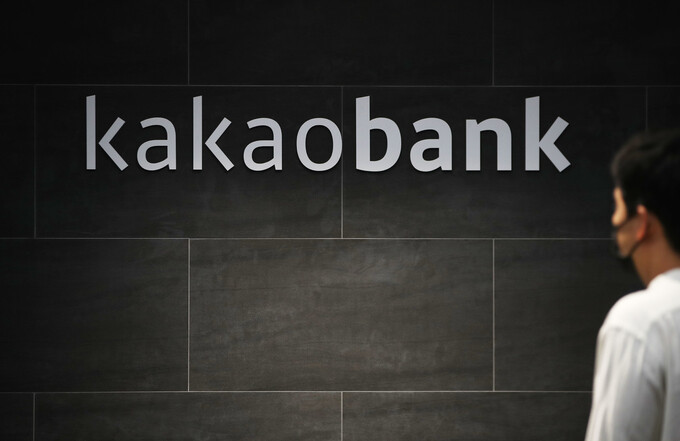 |
KakaoBank's logo (Yonhap) |
KakaoBank became the largest financial company in South Korea by market capitalization with its market debut Friday, although its share price failed to meet expectations of hitting the daily upper limit.
Shares of the country’s biggest mobile-only bank began trading at 53,700 won ($46.98), 37.7 percent higher than its initial public offering price of 39,000 won. It later rose a further 26 percent to 68,000 won during the morning trade, far less than the market expectation of reaching the daily limit of a 160 percent increase.
Soon after it began trading on the nation’s main bourse Kospi, KakaoBank’s market cap surpassed 30 trillion won, catapulting it to No. 11 among top Kospi-listed companies. It outpaced other traditional lenders, including KB Financial, which has been the largest financial company with a market value of 22 trillion won.
Prior to its market debut, KakaoBank has been under market spotlight with investors holding out hope that its shares would achieve the so-called “ddasang” status. Ddasang, meaning double increases in Korean, is a market slang describing shares that reach the daily upper limit on their first day of flotation.
The mobile banking arm under messenger giant Kakao drew an all-time high of 2,585 trillion won from 1,667 domestic and overseas institutional investors last month during its two-day book-building, oversubscribed by 1,733 times. Retail investors poured 58 trillion won into the bank’s stocks, the fifth-largest subscription deposit in South Korean IPO history.
Founded in 2017, the digital bank had 16.15 million registered users as of the end of March and its monthly active users reached 13.35 million, making it the most frequently used financial app.
The company made profit for the first time in 2019 and the numbers have continued to rise since then. In the first quarter of this year, its net profit reached 46.7 billion won. This is about 40 percent of last year’s net profit.
The bank vowed to expand its business scope after the IPO and put efforts to increase loans for “thin filers,” those who lack credit information and often have troubling getting loans from banks. To address such problems faced by those seeking loans, the government had singled out two digital lenders -- K bank and KakaoBank -- and asked them to increase financial services for low- and mid-credit holders.
The success of the two digital banks has propelled more players to jump into the market, one of which is Toss Bank, the third internet-only bank, which is slated to launch in September.
By Park Ga-young (
gypark@heraldcorp.com)








